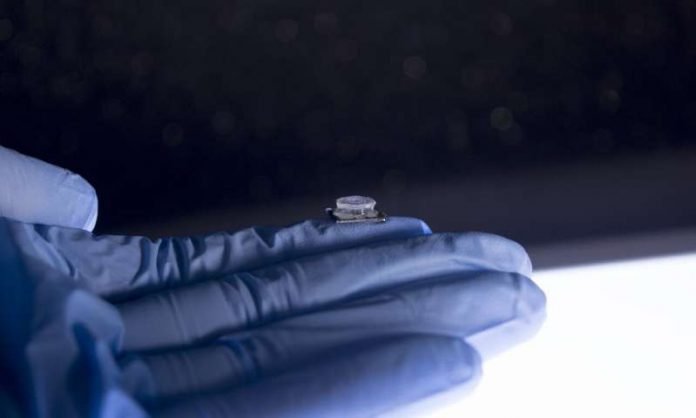
In a new study, researchers developed a new infection test that could provide cheaper, faster COVID-19 diagnosis.
The research was conducted by a team at Imperial College London.
The chip, known as TriSilix, is a ‘micro laboratory’ which performs a miniature version of the polymerase chain reaction (PCR) on the spot.
PCR is the gold-standard test for detecting viruses and bacteria in biological samples such as bodily fluids, feces, or environmental samples.
Although PCR is usually performed in a laboratory, which means test results aren’t immediately available, this new lab-on-a-chip can process and present results in a matter of minutes.
The new chip is made from silicon, the same material that is used to make electronic chips.
Silicon itself is cheap, however, it is expensive to process into chips which require massive, ‘extremely clean’ factories otherwise known as cleanrooms.
To make the new lab-on-chip, the researchers developed a series of methods to produce the chips in a standard laboratory, cutting the costs and time they take to fabricate, potentially allowing them to be produced anywhere in the world.
Rather than sending swabs to the lab or going to a clinic, the lab could come to the patient on a fingernail-sized chip.
They would use the test much like how people with diabetes use blood sugar tests, by providing a sample and waiting for results—except this time it’s for infectious diseases.
The researchers have so far used TriSilix to diagnose a bacterial infection mainly present in animals as well as a synthetic version of the genetic material from COVID-19.
The researchers say the system could in the future be mounted onto handheld blood sugar test-style devices.
This would let people test themselves and receive results at home for colds, flu, recurrent infections like those of the urinary tract (UTIs), and COVID-19.
If validated on human samples, this new test could provide results outside a clinic, at home, or on-the-go within minutes.
One author of the study is Dr. Firat Guder of Imperial’s Department of Bioengineering.
The study is published in Nature Communications.
Copyright © 2020 Knowridge Science Report. All rights reserved.



